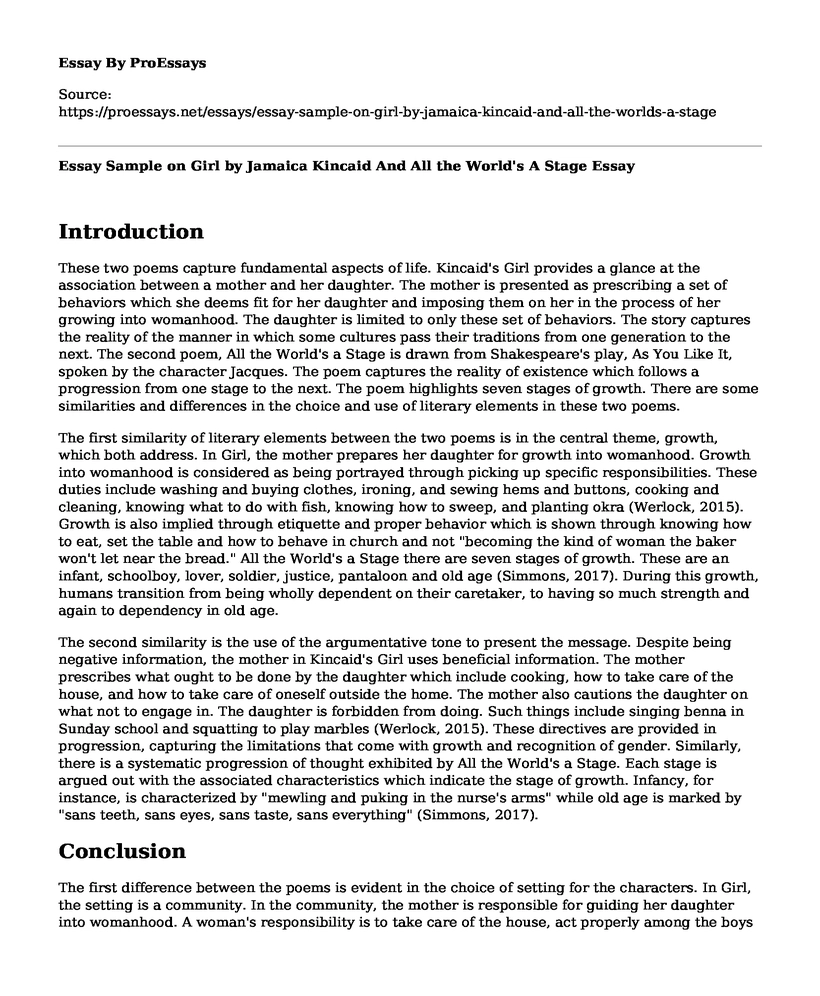Introduction
These two poems capture fundamental aspects of life. Kincaid's Girl provides a glance at the association between a mother and her daughter. The mother is presented as prescribing a set of behaviors which she deems fit for her daughter and imposing them on her in the process of her growing into womanhood. The daughter is limited to only these set of behaviors. The story captures the reality of the manner in which some cultures pass their traditions from one generation to the next. The second poem, All the World's a Stage is drawn from Shakespeare's play, As You Like It, spoken by the character Jacques. The poem captures the reality of existence which follows a progression from one stage to the next. The poem highlights seven stages of growth. There are some similarities and differences in the choice and use of literary elements in these two poems.
The first similarity of literary elements between the two poems is in the central theme, growth, which both address. In Girl, the mother prepares her daughter for growth into womanhood. Growth into womanhood is considered as being portrayed through picking up specific responsibilities. These duties include washing and buying clothes, ironing, and sewing hems and buttons, cooking and cleaning, knowing what to do with fish, knowing how to sweep, and planting okra (Werlock, 2015). Growth is also implied through etiquette and proper behavior which is shown through knowing how to eat, set the table and how to behave in church and not "becoming the kind of woman the baker won't let near the bread." All the World's a Stage there are seven stages of growth. These are an infant, schoolboy, lover, soldier, justice, pantaloon and old age (Simmons, 2017). During this growth, humans transition from being wholly dependent on their caretaker, to having so much strength and again to dependency in old age.
The second similarity is the use of the argumentative tone to present the message. Despite being negative information, the mother in Kincaid's Girl uses beneficial information. The mother prescribes what ought to be done by the daughter which include cooking, how to take care of the house, and how to take care of oneself outside the home. The mother also cautions the daughter on what not to engage in. The daughter is forbidden from doing. Such things include singing benna in Sunday school and squatting to play marbles (Werlock, 2015). These directives are provided in progression, capturing the limitations that come with growth and recognition of gender. Similarly, there is a systematic progression of thought exhibited by All the World's a Stage. Each stage is argued out with the associated characteristics which indicate the stage of growth. Infancy, for instance, is characterized by "mewling and puking in the nurse's arms" while old age is marked by "sans teeth, sans eyes, sans taste, sans everything" (Simmons, 2017).
Conclusion
The first difference between the poems is evident in the choice of setting for the characters. In Girl, the setting is a community. In the community, the mother is responsible for guiding her daughter into womanhood. A woman's responsibility is to take care of the house, act properly among the boys and in church, and provide the best meals for the family. In All the World's a Stage, the setting is a stage. Foremost, the poem is derived from a play. The title and the systematic progression of characters also advance the use of a stage as the setting. The second difference between the poems is the gender of the characters. In Girl, the characters are female. In All the World's a Stage, the central character is male.
References
Simmons, R. G. (2017). Moving into adolescence: The impact of pubertal change and school context. Routledge.
Werlock, A. H. (Ed.). (2015). Encyclopedia of the American Short Story. Infobase Learning.
Cite this page
Essay Sample on Girl by Jamaica Kincaid And All the World's A Stage. (2022, Nov 14). Retrieved from https://proessays.net/essays/essay-sample-on-girl-by-jamaica-kincaid-and-all-the-worlds-a-stage
If you are the original author of this essay and no longer wish to have it published on the ProEssays website, please click below to request its removal:
- Critical Analysis of Bag of Bones Using Literature Criticism
- Essay Sample on Victor & Henry: Closest Friends in Mary Shelley's Frankenstein
- Excerpts From Paradise Lost Analysis Paper Example
- Poetry and Graphic Design Essay
- Macbeth: Examining Traditional Gender Perspectives & Roles - Essay Sample
- Essay Example on Adam's Wish To Live Forever: An Analysis of Shaw's Play
- El Callejon del Beso: A Romantic Folk Tale of Mexico - Book Review Sample







